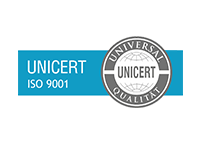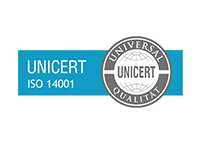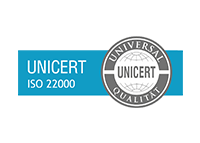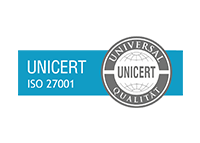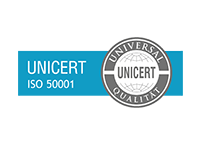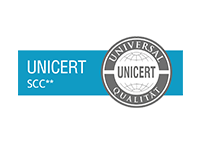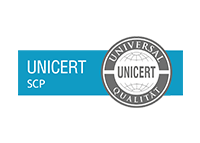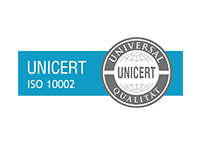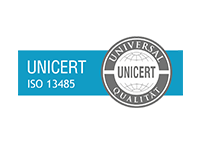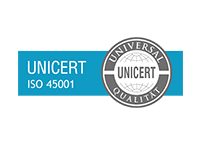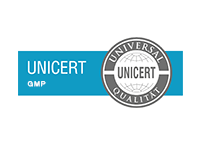systemZertifizierungen
Wir bieten Ihnen eine Vielzahl von Zertifizierungsmöglichkeiten in den unterschiedlichsten Wirkungsbereichen an. Überzeugen Sie Sich selbst.
Systemzertifizierungen - Zertifizierungsdienste
Die Zertifizierungsgesellschaft bietet Ihnen eine Vielzahl an Zertifizierungsmöglichkeiten in den unterschiedlichsten Wirkungsbereichen
für Ihr Unternehmen – und das mit System. Nachfolgend finden Sie eine Auflistung der gängigsten und meistgenutzten
Zertifizierungen sowie deren Definition und Einsatzgebiete.
Unsere Zertifizierungsdienste
Weiterführende Informationen erhalten Sie durch klicken auf das jeweilige Logo.
Unsere Zertifizierungsdienste
Weiterführende Informationen erhalten Sie durch klicken auf das jeweilige Logo.
EN ISO 9001 Zertifizierung des Qualitätsmanagementsystems
Die neue Version der DIN EN ISO 9001:2015 wurde im September 2015 von der Internationalen Organisation für Normung (ISO) veröffentlicht. Weltweit gilt eine Übergangsfrist von drei Jahren. Innerhalb dieser Frist müssen Qualitätsmanagement-Systeme auf die neue Revision umgestellt sein. Zertifikate nach ISO 9001:2008 sind bis zum 14. September 2018 gültig.
Die neue ISO 9001:2015 verfolgt einen prozessorientierten Ansatz und orientiert sich an der Praxis in Betrieben und Dienstleistungsunternehmen. Der Fokus liegt verstärkt auf dem systematischen Umgang mit Risiken und Chancen, welche die Zielerreichung der Prozesse beeinflussen. Die oberste Managementebene wird stärker in den Qualitätsmanagement-Prozess mit einbezogen und trägt die Verantwortung für die Wirksamkeit und die Leistungsfähigkeit des Qualitätsmanagement-Systems.
Die Ziele der ISO 9001
- Implementierung eines zertifizierten Qualitätsmanagements gemäß den Anforderungen der ISO 9001-Norm
- Erhöhung der Kundenzufriedenheit
- Einbeziehung aller Mitarbeiter in die Qualitätssicherung
- Verbesserung der Wertschöpfung für die Organisation und den Kunden
- Steigerung der Wettbewerbsfähigkeit durch das Einhalten von internationalen Standards
- Erfüllung von Voraussetzungen für Auftragserteilung seitens neuer Hersteller, Zulieferer und großer internationaler Unternehmen
- Zugang zu neuen Märkten und Kunden im In- und Ausland
- Risikoreduzierung und Chancennutzung
- Verbesserte Gesamtleistung und finanzieller Erfolg des Unternehmens
EN ISO 14001 Zertifizierung des Umweltmanagementsystems
Hierbei handelt es sich um die zertifizierte und kontinuierliche Sicherstellung, dass alle Produktions- oder Dienstleistungsrelevanten Prozesse innerhalb eines Unternehmens im Rahmen der umweltbedingten Vorschriften sowie nach den gesetzlichen Bestimmungen durchgeführt werden.
Dabei ist es eine Tatsache, dass die verschiedenen Umwelteinflüsse von Unternehmen mitunter auf ganze Ökosysteme einwirken und auch die natürlichen, insbesondere fossilen Rohstoffe nicht unbeschränkt verfügbar sein werden.
Im Hinblick auf den Status als Unternehmen am Weltmarkt und den damit verbundenen Kundenerwartungen und Bedürfnissen gilt es hier, die Unternehmensprozesse dahingehend auch im Umweltbereich zu optimieren und auch nachhaltig zu kontrollieren.
Die Ziele der ISO 14001
- Konformität mit nationalen / internationalen Vorschriften
- Erhöhung der Rechtssicherheit des Unternehmers durch das Erfüllen gesetzlicher Forderungen und Auflagen
- Gewahrung der Sicherstellung der unternehmerischen Sorgfaltspflicht
- Reduzierung der Schadstoffe
- Verringerung der Umweltbelastung
- Reduzierung von Unfall- und Haftungsrisiken
- Wettbewerbsvorteile, da viele Kunden ein UM-System fordern
- Sensibilisierung der Mitarbeiter für umweltschutzrelevante Themen
- Kostenreduzierung bei Abfallentsorgung, Material-, Wasser- und Energieverbrauch
EN ISO 22000 Managementsystem für Lebensmittelsicherheit
Bei der ISO 22000 handelt es sich um ein Managementsystem, welches zur Erkennung von vorhandenen und potentiellen Risiken in der Nahrungsmittelherstellung implementiert und eingesetzt wird. Hierbei werden entsprechende Gefahren definiert, Vorsichtsmaßnahmen ergriffen, Ergebnisse bewertet und zudem in der Anwendung kontinuierlich verbessert.
Heute stellt die Thematik der Nahrungsmittelindustrie ein globales Thema dar, dass, durch in Lebensmittel verborgene Krankheiten, nicht nur Einfluss auf das menschliche Leben, sondern auch auf die Wirtschaft der Länder und Institutionen nimmt. Jedes Jahr sind unzählige Menschen global von den Folgen einer Lebensmittelvergiftung und den verursachenden Krankheiten betroffen, wobei es fast in allen Fällen zu Entschädigungszahlungen der Herstellerfirmen kommt, was zudem einen Prestige- und Imageschaden der Unternehmen nach sich zieht.
Die Sicherstellung der Qualität und Sicherung von Lebensmitteln ist eine unvermeidliche Bedingung für die Nachhaltigkeit der Betriebe vom „Bauernhof bis zur Gabel“ in der Lebensmittelkette. Aus diesem Grund wurde das Risikomanagement für all jene Betriebe zu einer unmittelbaren Bedingung, welche Restaurants, Cateringbetriebe, Verpackungsservice usw. versorgen. Ebenso gilt dies für Zulieferer von Chemikalien, Zubehör oder Dienstleister im Transport- und Logistikbereich.
Daher spielt Sicherheit hier eine entscheidende Rolle und wird insbesondere von Endverbrauchern immer mehr geschätzt. Betriebe mit entsprechenden Sicherheitsmaßnahmen werden somit gezielt bevorzugt.
Mit der ISO 22000 kann ein Unternehmen, mittels verschiedener und effektiver Lebensmittelsicherungsysteme, eine solche Absicherung vorweisen. Dabei ist dieses Managementsystem für alle Betriebe in der Lebensmittelversorgungskette gültig und entspricht dabei den Bestimmungen der ISO 9001 und ISO 14001.
Die Ziele der ISO 22000
- Dem Kunden eine verlässliche Aussage hinsichtlich der Hygiene und der Produktherstellung geben.
- Aufzeigen, dass alle erforderlichen Maßnahmen während der Herstellung von Lebensmitteln eingehalten wurden.
- Quellenrelevante Optimierung innerhalb der Lebensmittelversorgungskette
- Durchführung einer Risikoanalyse
- Steigerung der Produktqualität und Produktzuverlässigkeit
- Vorbeugemaßnahmen gegenüber Gefahren innerhalb der Produktionsabläufe
- Gewährleistung von stabilen und sicheren Produktionsabläufen von der Qualitätskontrolle bis zur vorbeugenden Qualitätssicherung
- Minderung der Kosten aus Verlusten und Rückgaben
EN ISO 27001 Informationssicherheit
Die ISO 27001 ist der internationale Standard für ein wirksames Informationssicherheits-Managementsystem und bildet die Basis zum Schutz von vertraulichen Daten. Mit der ISO 27001 verfügen Unternehmen über einen systematischen Leitfaden, mit dem sie die eigenen Informationssysteme zur Unterstützung der Geschäftsprozesse planen, umsetzen, überwachen und verbessern können.
Die Ziele der ISO 27001
- Gewährleistung des Fortgangs der Arbeit auch im Angriffs- oder Schadensfall
- Ermöglichung eines höheren Vertrauens seitens der Auftraggeber
- Sicherstellung der Einhaltung der Vorschriften
- Sicherung der Rentabilität und des Unternehmensimages
- Computerunterstützter Schutz der Datensysteme und -netze vor möglichen Bedrohungen und Gefahren, wie z. B. Betrug, Spionage, Sabotage, Feuerbrand oder Überschwemmungen
EN ISO 50001 Internationales Energie-Management-System
Es ist das erste globale Energiemanagementsystem, welches nach dem regionalen und nationalen Standards wie EN 16001 veröffentlicht wird. Das ISO 50001 Energiemanagementsystem enthält forcierte Leistungen und Verfahren, die zu einer Bestimmung des jeweiligen Energiebedarfs sowie der Messung und Aufzeichnung von Verbrauchswerten erforderlich sind. Mittels der Schaffung eines essentiellen und systematischen Energiebewusstseins zielt es darauf ab, die Kosten und Umweltauswirkungen, wie z. B. Treibhausgasemissionen, deutlich zu verringern. Der Standard der ISO 50001 Energiemanagementsystem kann von Unternehmen jeder Art und Größe, ohne Einfluss durch geographische, kulturelle oder soziale Faktoren, eingesetzt werden.
Der Standard ist allgemein für einen unabhängigen Einsatz konzipiert. Falls jedoch gewünscht, kann dieser nach Absprache auch mit anderen Verwaltungssystemen angewendet oder integriert werden.
Die Ziele der ISO 50001
- Erhöhung der Energieproduktivität
- Verbesserung der Umweltbilanz
- Geringere Sicherheitsrisiken im Energiebereich
- Erhöhung der Wirtschaftlichkeit durch Senkung der Energiekosten
SCC* / SCC** / SCCP Sicherheitszertifikat für Auftragnehmer
Unfällen und Sachschäden vorbeugen
In Industrieparks und großen Werken werden zunehmend Kontraktoren für technische Dienst- oder Werkleistungen eingesetzt. Zum Nachweis, dass wesentliche Arbeitsschutzanforderungen eingehalten werden, bietet UNIVERSAL GmbH für diese Unternehmen eine freiwillige Zertifizierung gemäß SCC-Regelwerk (Sicherheits Certifikat Contraktoren) an.
Eintrittskarte in den Markt
Das SCC-Zertifikat ist in vielen Branchen – national ebenso wie international – eine unverzichtbare Voraussetzung, um bei der Auswahl von Auftragnehmern Berücksichtigung zu finden. Außerdem profitieren zertifizierte Kontraktoren von Rechtssicherheit, optimierten Managementprozessen und efizienteren Arbeitsabläufen. Dies hilft Risiken durch Störungen im Betriebsablauf, Umwelt- und Sachschäden sowie Ausfallkosten zu senken.
Drei Varianten der SCC Zertifizierung
Für Unternehmen mit bis zu 35 Beschäftigten genügt eine eingeschränkte Zertifizierung (SCC*). Bei Unternehmen mit mehr als 35 Mitarbeitern ist eine uneingeschränkte Zertifizierung (SCC**) nötig; ebenso bei Unternehmen mit weniger als 35 Beschäftigten, wenn sie selbst Kontraktoren einsetzen. Für Unternehmen, die Arbeitskräfte in der petrochemischen Industrie oder in Rafinerien einsetzen, gibt es die Zertifizierung SCCP. Gefordert sind jeweils eine Ermittlung der Unfallhäufigkeit und deren Abgleich mit Grenzwerten, eine standardisierte Ausbildung von Mitarbeitern und Führungskräften sowie die positive Beantwortung der Fragen aus der SCC-Checkliste. Außerdem finden Projektbesuche statt, um die Arbeitsschutzumgebung während der Ausübung der Kontraktortätigkeit zu beurteilen.
Die SCC Zertifizierung mit anderen Zertifikaten kombinieren
Die SCC-Zertifizierung kann separat, aber auch gemeinsam mit anderen Zertifizierungen wie DIN EN ISO 9001 (Qualitätsmanagement) oder DIN EN ISO 14001 (Umweltschutzmanagement) durchgeführt werden. Wir informieren Sie gern.
SCP – Sicherheitszertifikat für eine professionelle Arbeitgeberorganisation
Wenn Unternehmen anderen Unternehmen Personal überlassen, ist dies mit besonderen Risiken verbunden: Weil die Mitarbeiter den Einsatzort häufig wechseln, sind sie nicht sofort mit allen Gegebenheiten vollständig vertraut; dadurch erhöht sich die Gefahr von Unfällen, Betriebsstörungen und Sachschäden. Um dem vorzubeugen, bietet UNIVERSAL GmbH für Personaldienstleister eine Zertifizierung nach dem SCP-Regelwerk (Sicherheits Certifikat Personaldienstleister) an. Grundlage ist das SCC-Regelwerk (SicherheitsCertifikat Contraktoren).
Höhere Chance auf Aufträge
Das SCP-Zertifikat ist in vielen Branchen – national ebenso wie international – eine unverzichtbare Voraussetzung, um bei der Auswahl von Auftragnehmern Berücksichtigung zu nden. Die Zertifizierung macht deutlich, dass das Personal des jeweiligen Personaldienstleisters zuverlässig und sicherheitsorientiert ausgewählt wird und entsprechend qualifiziert ist. Dies gibt auch den Auftraggebern Sicherheit – und macht SCP-zertifizierte Unternehmen deshalb zu bevorzugten Partnern. Daneben ergeben sich aus dem Audit Vorteile im Hinblick auf Rechtssicherheit, optimierte Managementprozesse und efizientere Arbeitsabläufe.
Kombination mit weiteren Zertifizierungen
Für eine erfolgreiche Zertifizierung müssen die Fragen aus der SCP-Checkliste positiv beantwortet sein und bei Mitarbeitern und Führungskräften wird eine standardisierte Ausbildung vorausgesetzt. Außerdem finden Gespräche mit den Zeitarbeitskräften des Personaldienstleisters statt.
Sinnvolle Kombinationen
Die SCP-Zertifizierung kann separat, aber auch gemeinsam mit anderen Zertifizierungen wie DIN EN ISO 9001 (Qualitätsmanagement) oder DIN EN ISO 14001 (Umweltschutzmanagement) durchgeführt werden. Wir informieren Sie gern.
EN ISO 45001 Arbeitsschutzmanagementsysteme
Dieses Managementsystem bewirkt eine Systematisierung der Sicherheitsaktivitäten, sowie eine systematische Verbesserung der Rechtssicherheit und der Rahmenbedingungen. Das Bewusstsein für Arbeitssicherheitsrisiken wird gestärkt, gesetzliche Forderungen bzgl. der Arbeitssicherheit werden nachweislich erfüllt. Eine offene Informationspolitik über Themen der Arbeitssicherheit und des Gesundheitsschutzes wird betrieben. Prozesse werden systematisch untersucht, Maßnahmen festgelegt, umgesetzt und beurteilt.
Die Ziele der ISO 45001
- Einhergehen mit nationalen und internationalen Bestimmungen
- Erhöhung der Produktivität und Rentabilität und Minderung von Arbeitsunfällen oder Berufskrankheiten
- Förderung der Motivation Ihrer Mitarbeiter und der Bereitschaft zur Teilnahme an präventiven Maßnahmen
- Sicherstellung eines gesunden und sicheren Arbeitsplatzes für die Arbeitnehmer
- Ermöglichung einer höheren Notfallbereitschaft und entsprechender Gegenmaßnahmen
EN ISO 13485 Qualitätsmanagementsysteme für medizinische Geräte
Die DIN ISO 13485 ist die ISO-Norm, welche die Anforderungen an ein prozessorientiertes Managementsystem für die Produktsicherheit und die Erfüllung von spezifischen Forderungen für Medizinprodukte darstellt.
Die Ziele der ISO 13485
- Implementierung eines gezielt eingesetzten Risikomanagements
- Einhaltung von gesetzlichen Regelungen
- Transparente und effiziente Prozesse
- Kontinuierliche Qualitätsverbesserung der Produkte
- Erhöhte Kundenzufriedenheit
EN ISO 10002 Management von Kundenbeschwerden
Der im Jahr 2004 von der ISO (International Organization for Standardization) veröffentlichte ISO 10002 Standard hat eine systematische Verwaltung von Kundenbeschwerden sowie die Gewährleistung und stetige Fordauer von Kundenzufriedenheit zum Ziel. Dabei spielt die Umwandlung von Unzufriedenheiten und Beschwerden unter Verwendung von verschiedenen systematischen und verwaltungsorganisatorischen Mitteln eine entscheidende Rolle. Der Standard ermöglicht somit eine gänzlich neue Perspektive auf eine auf den ersten Blick negativ erscheinende Kundenbeschwerde und vermittelt gezielt neue Verfahrensgrundsätze zum generellen Umgang mit solchen sowie zur Steigerung der Kundenzufriedenheit. Die Anwendung ist dabei als Unternehmen sowohl einzeln als auch Teil des ISO 9001-Systems möglich.
Die Ziele der ISO 10002
- Verbesserung der Kundenzufriedenheit
- Optimierung des vorhandenen Reklamationsprozesses
- Erkennen und Beachten von Kundenbedürfnissen
- Auditierbare Reklamationsprozesse
- Verbesserung der Produkt- oder Dienstleistungsqualität


